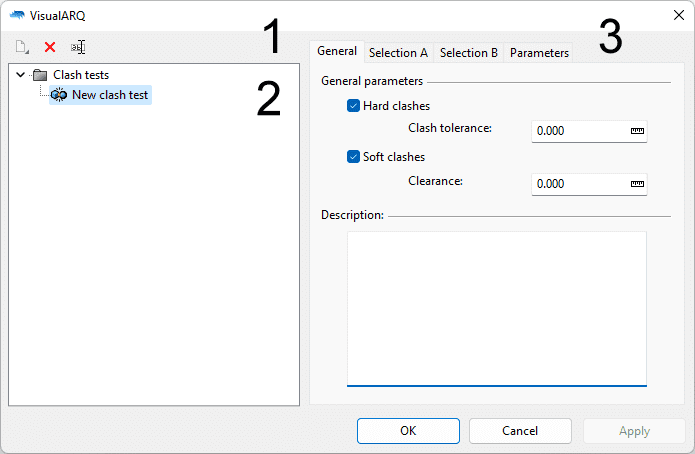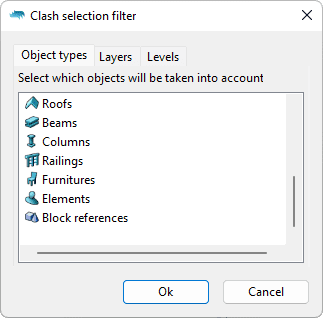Clash Tests
The Clash tests dialog lets you configure the tests for the Clashes report panel. A test compares two sets of geometry looking for clashes and clearances between any two objects in each set.
When you run the vaClashTests command, the Clash tests dialog will appear. This dialog is structured into 3 parts, in a similar way to the Styles Manager dialog.
- Toolbar
- Tests list
- Test settings

Clash Tests Dialog, General tab.
1. Toolbar
 New: adds a new test.
New: adds a new test. Delete: deletes a test after
its selection from the top left panel list.
Delete: deletes a test after
its selection from the top left panel list. Rename: changes
the name of a test.
Rename: changes
the name of a test.
2. Tests list
It shows the list of tests.
3. Test settings
General
In this tab you can define the general parameters for the test:
- Hard clash: option to calculate collisions between two objects of each set.
- Clash tolerance: minimum volume of collision that will be considered to display a hard clash.
- Soft clash: option to calculate clearances between two objects of each set.
- Clearance: clearance value to check where objects protrude within the defined clearance zone.
- Description: text box field to add comments for the test.
Selection A and B
These two tabs let you define the selection of objects to process in each set in the clash test.
- All objects: all the existing objects in the model and the new ones created will be analyzed in the test.
- Manual selection: option to select specific objects for the test. When this option is selected, the Select objects button is enabled. Click on it to select the objects in the model that will be included in the test. Click on the Clear selection button to reset the selection of objects.
Filters
Click on the Add/Edit Filters button to define the criterion to filter objects for the clash test. The Clash Selection Filter dialog will appear, with the option to filter objects by Type, Layer, and Level in different tabs:
You can select multiple object types, layers or levels in each corresponding tab:

Clash Selection Filter, Objects tab.
Once the filter selection has been added, it will appear in the Filters list. Click again on the Add/Edit Filters button to edit the filters.
 right click
[
right click
[